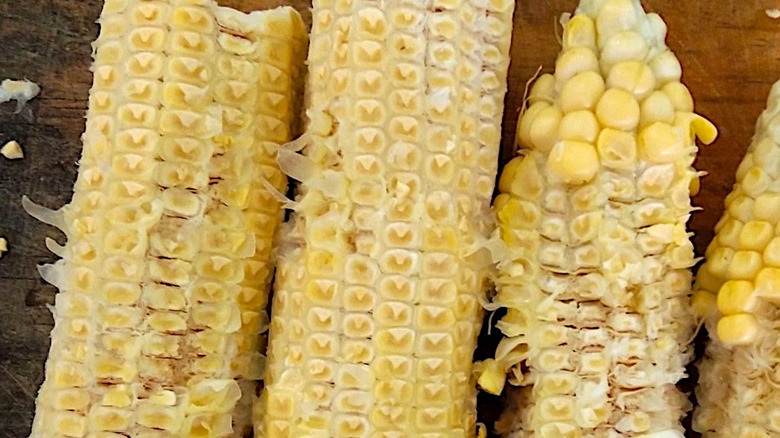Don't Throw Out Those Corn Cobs — Put Them To Work In Your Smoker
Smoking food with wood chips is common practice, but it's certainly not the only way to maximize flavor in smoked hams, brisket, pulled chicken, ribs, salmon, and other cuts of meat. For a quirky twist on smoking proteins, vegetables, and fruits, we're looking at humble pieces of cobbed corn. But it's not the kernels taking center stage here; it's the cobs once cradling those juicy morsels.
Spent corn cobs, meaning the leftover fibrous, wood-like cores after kernels have been removed, are sturdy enough to withstand heat and generate smoke. And they still harbor a whole lot of flavor and natural sweetness that permeates your food. It's a win for tasty barbecue meals, and a win for sustainability. Those cobs might otherwise be tossed out in a lose-lose scenario. Then there's the affordability factor. You've already spent money on the corn kernels, possibly even grilling or smoking your corn-on-the-cob — so now the leftover cobs are essentially free, saving the cost of pricy wood chips.
That mild, sweet smoke is reason enough to use corn cobs in your smoker, but there's another incentive as well. Unlike using papery leftover corn husks, which burn quickly in a blaze of glory, opting for those thick cobs brings a slow and even burn similar to hardwoods. The smolder also releases a gentler smoke that doesn't overpower lean poultry, fish, side dishes, or meat alternatives. For robust meats and thicker cuts, like beef, bacon, and whole hams, consider ramping up the smoke and flavor factor with a mix of corn cobs and hickory or other wood chips.
To soak or not to soak
Many pitmasters or home-Q' enthusiasts advocate using dried corn cobs in the smoker. When moisture is removed and woody cobs are thoroughly dried out, they'll smolder more slowly, generating a genial smoke that goes the distance for time-intensive smoking sessions. Air drying so-called "naked" cobs is the easiest way to prep them for smoking, though it could take several days. To speed things up, pop the cobs in your oven on low heat for a few hours.
When it's time for cobs to hit the heat, break them up into chunks, ideally 2 to 3 inches long. This makes it easier to scatter them over a wider range, distributing the smoke evenly and consistently. Depending on your smoking method, just lay the pieces on top of hot coals or add them to a smoker box. One caveat to using totally dried corn cobs is the possibility of flare-ups. To avoid that, try quick-dipping them in water for about 15 minutes just before use.
Wet cobs sometimes get frowned upon because they generate steam and excessive smoke, while also sizzling out more quickly than dried cobs. However, not all outdoor chefs agree, preferring wet versions for smoking thin meats or seafood that cook relatively fast. That includes things like chicken wings, catfish strips, burgers, pork chop, or shrimp and crab. The so-called "wet" cobs could refer to freshly cooked versions, or ones that have been soaked in water for several hours.

